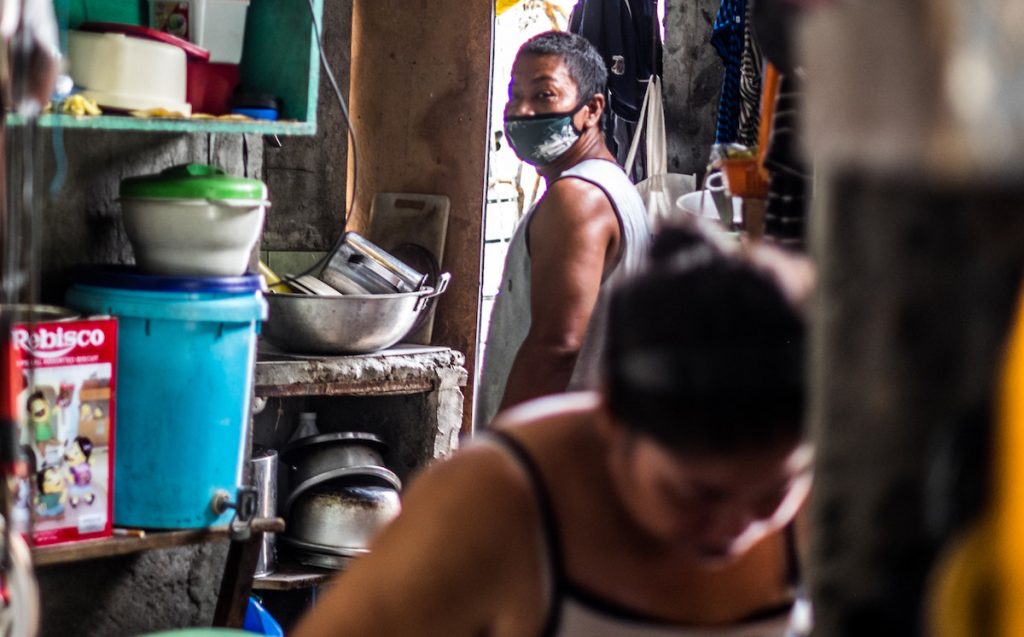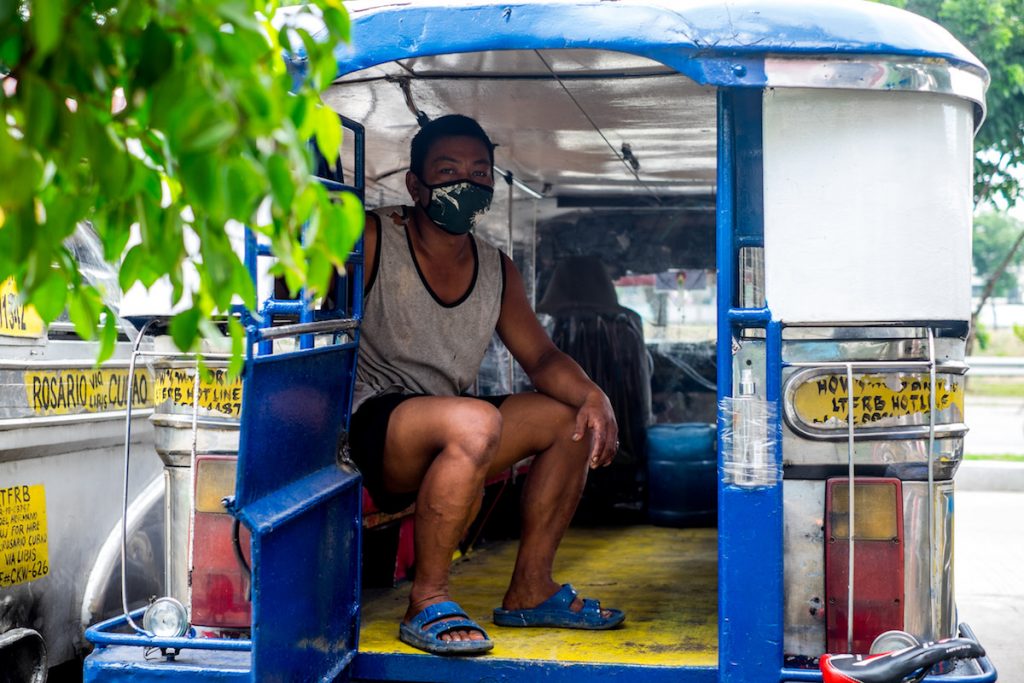One can easily notice an array of colorful houses on the banks of Marikina River in the outskirts of the Philippine capital, but behind the glitter is the grim reality that was brought about by the coronavirus pandemic.
Those living in the “Dutch houses,” as locals call them, are poor drivers of public utility jeeps that used to ply the streets of the capital during the pre-pandemic days.
One of these drivers is 42-year-old Jesus Baitan, who, in the past 15 years, never lost control of the wheel, and his life, until the coronavirus pandemic happened.
Baitan and his wife, Arlene, 51, their six children and 3-year-old grandchild are squeezed inside a 10-square-meter room on the second floor of a red Dutch house.
Baitan is among the 70,000 jeepney drivers who lost their source of income after the government decided to suspend most public transportation since March 16 due to the pandemic.
Jeepneys, sometimes called simply jeeps, are small buses and the most popular means of public transportation ubiquitous in the Philippines.
They are known for their crowded seating and kitsch decorations, which have become a wide-spread symbol of Philippine culture and art.
Like Baitan, three of his children lost their jobs because of the pandemic.
Even after quarantine measures started to ease in June, they all failed to go back to work because they could not afford to pay the test for the new coronavirus disease.
The average cost of a swab test in Manila is US$80.
“How can we afford that? We can barely eat one decent meal a day,” Baitan said.
He said food in the past three months consisted only of cups of instant coffee, a few cups of rice and noodles from the government.
Baitan has already sold two of his children’s mobile phones and a bicycle for US$40.
He said that with the money, the family was able to buy two kilograms of rice, a bottle of soy sauce, and salt that lasted only five days.
At least the grandchild was able to have a taste of milk after weeks of just taking in gruel.

On lean days, the family would appeal from a nearby store for a few tablespoons of oil and a few pieces of citrus that they squeeze on the rice.
“It’s delicious,” said Baitan. “The rice becomes sticky and you can taste a bit of flavor.” He described it as “heaven,” making him forget for a moment the situation his family is in.
He recalled having to tell his sons to stop going to school.
“My 10-year-old was already enrolled in school, but we can’t let him continue because they said classes are to be held online,” Baitan said.
“What are we supposed to do? We don’t have an internet connection and we already sold the telephones,” he said.
Another son, who is already in third year college, had to stop going to school to help the family look for a source of income.
The son said it took his parents days to finally talk to him about stopping his studies.
“Finally, they might have realized that there’s really nothing else I can do about it,” he said.
What bothers Baitan most, however, is the accumulating debt he has with the landlord.
He said they might start packing their things soon and move out of their rented red Dutch house.
The landlord has been demanding five months of delayed rent payment.
Baitan has to settle US$350 by the end of the month to keep the place, an amount the man is certain he doesn’t have.
“The bridge is always there, ma’am,” he said with a smile, pointing at a nearby bridge that crosses the rampaging waters of the Marikina River after an afternoon of monsoon rains.
“My wife and the kids can sleep in the jeep, while my son and I can sleep under the bridge,” said Baitan, adding that he does not really know what to do next.
But he said he does not want to demand or expect much from the government.
One time, during the pandemic lockdown, he joined a demonstration calling for help from authorities.
Instead of providing aid, the police arrested the protesters, including ten of Baitan’s friends.
For three days, the police went around the neighborhood, knocking on doors, looking for those who joined the demonstration.
“I don’t know what to ask from the government, I might be arrested next,” he said.

Early in July, as the jeepneys were allowed to resume operations in the capital, many of the vehicles in Marikina, including Baitan’s, remained parked outside the colorful Dutch houses.
Thousands of the “kings of the road,” as the jeepneys are called, were not allowed to ply their usual routes because they are deemed “not roadworthy” by the government’s new standards.
Unless the drivers shift to modern jeepneys, which costs US$23,400 each, it would be next to impossible for the likes of Baitan to be able to go back to the road.
Steve Ranjo, spokesman of transport group Piston, said several drivers have already resorted to begging because of lack of income
Meanwhile, workers have been fired from their jobs because of absences.
“One of the factors why many workers have been retrenched is due to the shortage of affordable transport networks,” said Ranjo.
In the three months that the nearly 70,000 drivers were prohibited to ply their routes in the capital, each lost about US$1,560, according to IBON Foundation, an independent non-profit research institution.
Ranjo said the “domino effect” brought by what seemed like a “little thing” of suspending mass transportations resulted in and will continue to result in the slowdown of the economy.
The Philippine economy recorded its first contraction after two decades in the first quarter, shrinking by 0.2 percent.
The Asian Development Bank had reported in June that the Philippine economy will “likely shrink” deeper to 3.8 percent this year, bigger than the 2-3.4 percent estimate by the government.
“The forecast for 2020 is revised down to 3.8 percent contraction because household consumption and investment have slowed more than expected,” according to ADB’s Outlook Supplement Report.
A contraction in the economy is the decline in the total national output measured by the incomes, expenditures, and production.
During his fifth State of the Nation address, Philippine President Rodrigo Duterte failed to mention those who are hurting because of the economic impact of the pandemic, including the jeepney drivers like Baitan.
The president might not have seen or might not have heard of the woes of the drivers squeezed behind those colorful Dutch houses on the banks of Marikina River in the outskirts of the Philippine capital.






